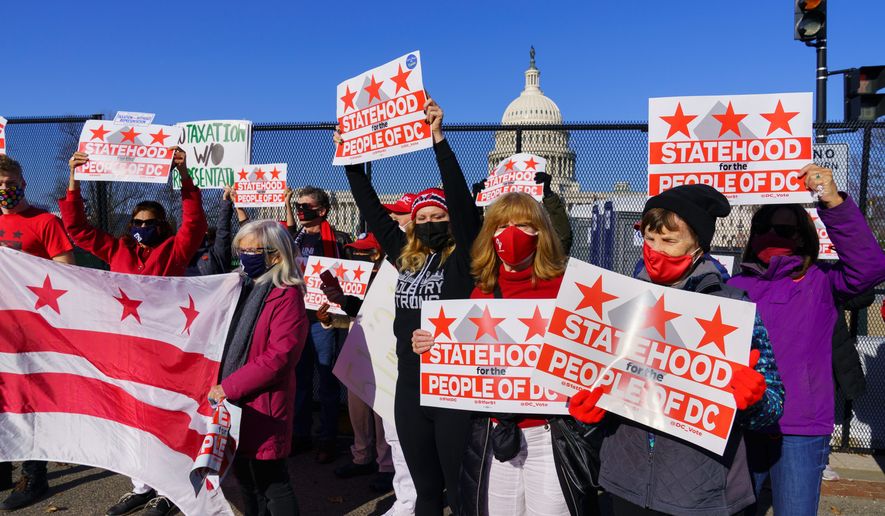D.C. Delegate Eleanor Holmes Norton on Monday testified before Congress about her bill that calls for establishing the District as the 51st state.
“Congress has two choices. It can continue to exercise undemocratic, autocratic authority over the American citizens who reside in our nation’s capital, treating them, in the words of Frederick Douglass, as ’aliens, not citizens, but subjects.’ Or it can live up to this nation’s promise and ideals, end taxation without representation and pass H.R. 51,” Mrs. Holmes said in her opening remarks.
The District’s non-voting congressional representative reintroduced the bill this year and said Monday that it has 215 co-sponsors — none of whom are Republican.
The hours-long hearing by the House Oversight and Reform Committee largely focused on the issues of fairness, constitutionality and whether the city is financially equipped to become a state.
Under H.R. 51, the District would be renamed the state of Washington, Douglass Commonwealth, in honor of Frederick Douglass. It would receive one voting representative in the House and two senators.
Several Republican committee members argued that the bill is a “power grab” by Democrats, noting that the District is overwhelmingly Democratic.
“Plan A was to eliminate the filibuster in the Senate, but since it appears [Sen.] Joe Manchin isn’t going to play these dirty Democratic games, now [House] Speaker [Nancy] Pelosi is stepping in to make Washington, D.C. — a city that is smaller than Columbus, Ohio, and a city that just happens to be 90% Democratic — the 51st state,” said Rep. James Comer, Kentucky Republican.
Mr. Comer said the bill is a key part of the “radical, leftist agenda to reshape America along with the Green New Deal, defunding the police and packing the Supreme Court.”
Rep. Carolyn B. Maloney, New York Democrat and committee chair, said “the real power grab is denying 712,000 tax-paying American citizens the right to vote.”
D.C. Mayor Muriel Bowser, who was called as a witness by Democrats, echoed Ms. Maloney’s comments and noted the city’s decades-long fight for statehood.
“Our quest for statehood has nothing to do with the current Congress, our quest for statehood is longstanding and it’s really rooted in our values and the values of both parties,” said Miss Bowser.
Rep. Glenn Grothman, Wisconsin Republican, later questioned Miss Bowser about how the new state’s economy would be funded, given that the city currently receives more than 30% of its funding from the federal government.
“Your economy is based on government, and your economy is based on tourism — in other words retail, which is a different thing other than manufacturing or mining or drilling,” Mr. Griffin said.
The mayor said city officials are investing in other energy sources and noted the economic importance of the District’s hospitality industry.
Debate shifted to the argument that the Founding Fathers intentionally established congressional control over the District to eliminate any undue influence on lawmakers by local residents.
“[T]his new state could easily bully the tiny federal enclave into interdependence on basic functioning, related not just to security matters, but also infrastructure: who would be providing electrical power to the new federal district, or water, even snow removal?” said Rep. Andy Biggs, Arizona Republican.
Rep. Andrew Clyde, Georgia Republican, asked Miss Bowser if she agreed that the Founders intended for the District to be a federal city, not a state.
“I do not agree that the Founders didn’t contemplate this District would have self-governance, representation or function as a city, county and a state — because that’s how we function today,” the Democratic mayor said.
Rep. Clay Higgins, Louisiana Republican, mentioned that implementing the bill would likely come with a lengthy process.
He said Congress would have to amend the Constitution, which designates the District as the seat of the federal government, and repeal the 23rd Amendment, which allows D.C. residents to cast votes for president and vice president. Maryland’s legislature also would have to be persuaded to rework an agreement under which the state ceded part of its land to the District for use by the federal government, Mr. Higgins said.
Miss Bowser repeatedly was asked if she would consider retrocession to Maryland, which would eliminate taxation without representation. She rejected the proposal, saying D.C. residents “are not residents of Maryland.”
• Emily Zantow can be reached at ezantow@washingtontimes.com.




Please read our comment policy before commenting.